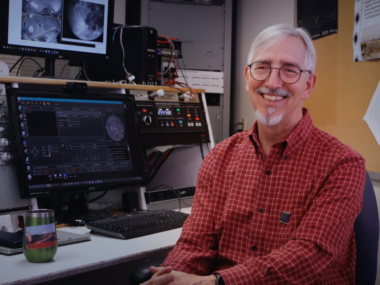Written by Brennan Black, BA’18
If luck is on your side next game night, the word “quantum” could score you 54 points on a triple-word play in Scrabble. It’s also the name of the nefarious organization that dogs James Bond in the 2008 film Quantum of Solace. And on TV, Dr. Sam Beckett spent years taking one “Quantum Leap” through time after another.
While these facts are great for trivia night, they don’t tell you what a quantum is and, more to the point, why you should care. Well, with a global quantum revolution underway in which the University of Calgary becoming a major player, it’s undoubtedly something we’ll be hearing a lot more about as our economy shifts and expands in robust and dynamic new directions. In the interest of ensuring you’re armed to score triple points in second-wave quantum-era conversation, here’s the 411 on the science of everything.
“At the very basic level, quantum mechanics describes everything,” says Dr. Barry Sanders, BSc’84, PhD, DSc, director of the Institute for Quantum Science and Technology at UCalgary. “Quantum mechanics is the set of rules for all of science.”
That seems important — so why isn’t quantum theory something people are more familiar with? According to Sanders, quantum mechanics is very counterintuitive and can be ignored for most macroscopic or large-scale purposes. For example, a bridge can be built without taking into account the laws of quantum mechanics.
“When we make things, we safely use a different description of nature because it’s easier to handle,” explains Sanders.
Up until a couple of decades ago, in fact, most of quantum mechanics was restricted to a scale smaller than anything the human eye can see. But things are starting to change because, says Sanders, “nowadays, our technology is getting so good, that we’re getting better and better at making this hidden reality manifest on a technological level.”
This hidden reality has already crawled out from underneath the bed in more ways than you might think. Sanders cites three prominent examples from the first “quantum revolution” in the mid-20th century. The first is the transistor, a key piece of technology behind the computer revolution. The second is lasers, which you encounter every time you scan a barcode at the grocery store. Third is magnetic resonance imaging (MRI), which allows those in the medical field to diagnose serious brain conditions like tumours, aneurysms and strokes.
Now that we’re well into the 21st century, a second quantum revolution is underway in three sectors: sensing, communications and computing. Quantum sensing has a potentially enormous range, from assessing patients at a molecular level to detecting the collisions of black holes. Quantum communications involves encrypting data so thoroughly that it can’t be hacked into by any computer — ever. By exploiting the quantum phenomenon of superposition, quantum computers will vastly outperform their poor binary cousins at problem-solving.
Thanks to the new Quantum City partnership with the Government of Alberta and the City of Calgary, UCalgary is aiming to ride the quantum wave of this revolution. The goal of Quantum City is to lure companies from industries such as computer software, computer hardware and communications to Calgary, where they can take advantage of the university’s strength in quantum science and technology. In practical terms, this means the creation of more local jobs, the transformation of Calgary’s economy and a boost in Calgary’s stature as an innovative city.
“The idea would be to develop a quantum ecosystem in Calgary that would allow the city to benefit from these advances,” says Sanders.
As this technology advances, will the science fiction of quantum theory as seen on the big screen become science reality? Could we one day shrink down to the atomic level like Ant-Man or send coded messages to our children in the past after being sucked into a black hole, like Matthew McConaughey did in Interstellar? Sanders says the laws of quantum mechanics don’t preclude such possibilities. We’ll be ready for it.




